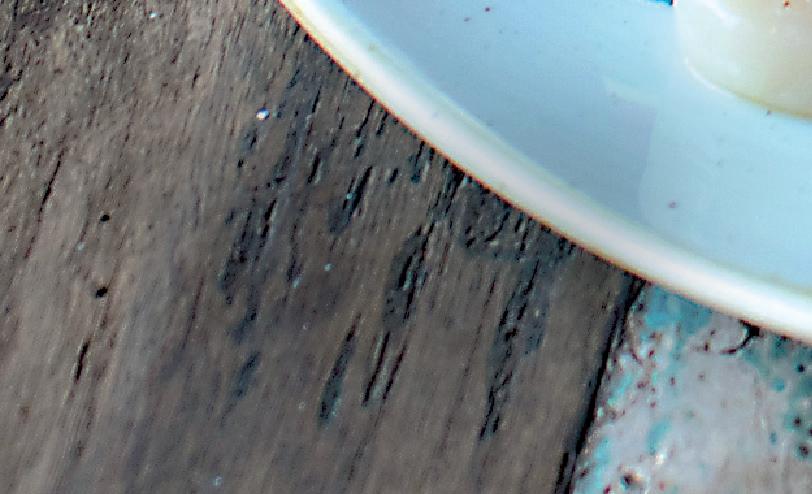INSIDE SHOP SMALL AT BONDI WASH FIREDOOR ON FIRE HIGH-STREET HEROES THE LARMONT WINTER SWIMMING MY DRY YEAR THE UNICORN’S PORK CHOPS

FULLY BOOKED
The amazing reinvention of local libraries




INSIDE SHOP SMALL AT BONDI WASH FIREDOOR ON FIRE HIGH-STREET HEROES THE LARMONT WINTER SWIMMING MY DRY YEAR THE UNICORN’S PORK CHOPS

The amazing reinvention of local libraries




THE WORD COMMUNITY IS BANDIED ABOUT A LOT. YOU HEAR ESPECIALLY IT IN RELATION TO ONLINE SPACES: THE FACEBOOK COMMUNITY; THE TWITTER COMMUNITY AND SO ON.
But at the same time, more people are living alone, loneliness and anxiety are soaring, people have virtual rather than real friends and do their shopping online, sending their money overseas. People can’t write a letter or have a phone conversation but live on WhatsApp messaging.
Personally I feel the online community can be phoney and alienating. Most people don’t present their real life on Facebook or Instagram.
This issue of Local East is designed as an antidote to all that. For June we decided to look at some quiet trends, specifically around the desire people have to reconnect with something real. Lara Picone’s story about the reinvention of libraries, It's Hip to be Square (page 32) is a case in point. Who would have thought that in the digital age that libraries, those bastions of books and silence, would become thriving community hubs? But they have. It helps that councils, architects and designers are putting incredible thought into the design aesthetic of libraries, making them places people want to be, where they can go to be with other people in a harmonious environment. We adore our cover image of the gorgeous new Green Square library shot by Trent van der Jagt, featuring lovely young reader Matilda Breen.
We are also incredibly proud to have partnered with American Express for this and forthcoming editions on their Shop Small initiative. American Express is a corporation that understands the importance of local retail and is prepared to back small business. This month we tell the story of local businesswoman Belinda Everingham, who founded the exquisite Bondi Wash brand. Everingham now has two retail stores — one in Bondi, the other in Paddington — and both offer exceptional retail experiences. We applaud you Belinda and thank American Express for helping us bring the Bondi Wash story to our pages.
Have a great month.
ELIZABETH MERYMENT PUBLISHER

PUBLISHER & EDITOR
Elizabeth Meryment lizzie@ localpublishingco.com.au 0412 151 845
ART DIRECTOR
Trevor Timms trevor@ localpublishingco.com.au
SUBEDITOR
Frances Hibbard
STAFF WRITER
Charlie Hale charlie@ localpublishingco.com.au
STYLE WRITER
Alexia Biggs alexia@alexiabiggs.com
CONTRIBUTORS
Neil Breen Jiwon Kim
Rory Kinsella
Sheree Mutton
Lara Picone
Trent van der Jagt
RECIPE BY
Jimmy Garside Head Chef, Mary’s Group
ADVERTISING &
Elizabeth Meryment 0412 151845
Francesca Mackay francesca@ localpublishingco.com.au 0412 853 130 CONTACT US

Van der Jagt’s background as a magazine photographer has given him a strong foundation in storytelling, branding and detail. He now specialises in food and lifestyle photography, shooting for local online publications including Broadsheet
“Musty, labyrinthine libraries are disappearing down the returns chute, along with stereotypes of bi-focalled biddies with greying buns” LARA











The Sydney Swans host the reigning premiers the West Coast Eagles at the SCG in what will be their first afternoon game of the season. Head to the pubs of Paddington or enjoy a pre-match meal in the Entertainment Quarter before taking in this AFL blockbuster. Save the date on the calendar and come watch Josh Kennedy and his team take on the men from the west.
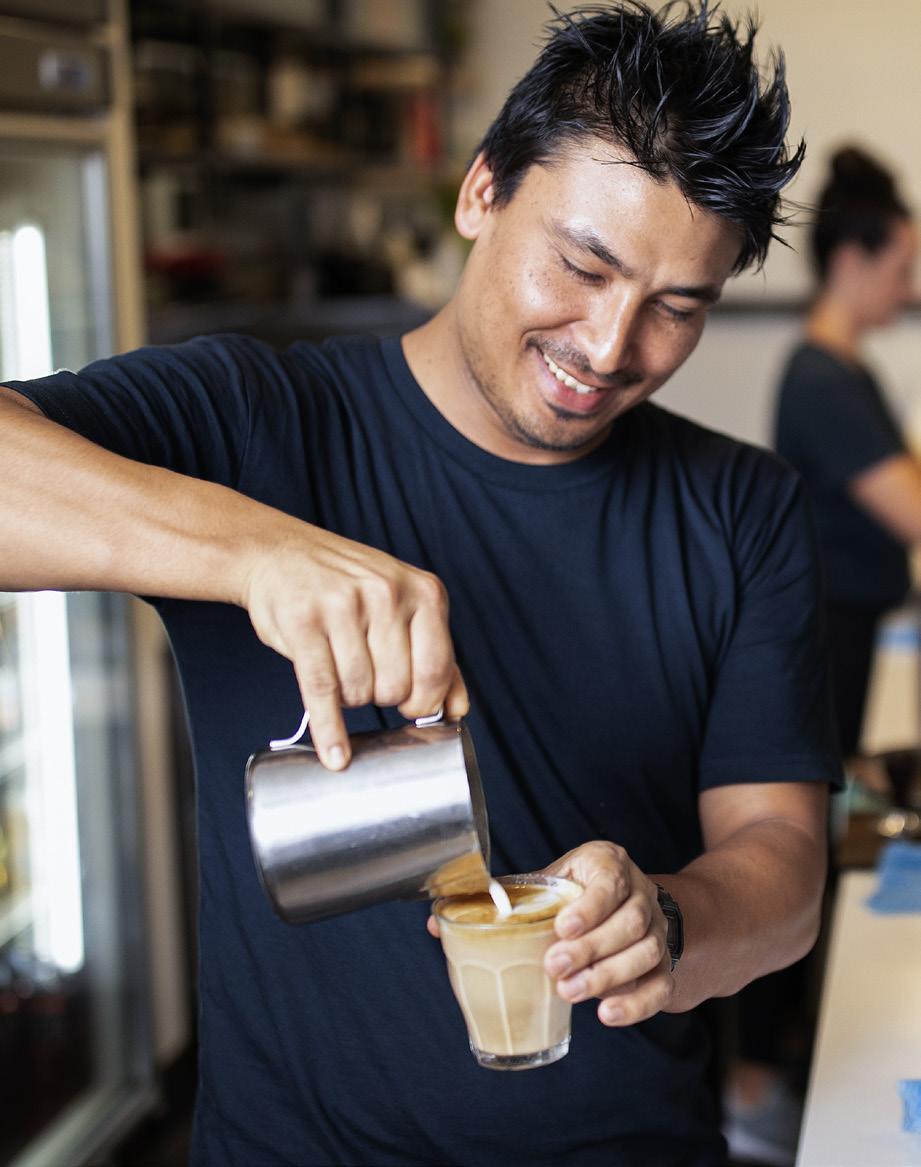




Azure is all about good food, fresh ingredients and quality service.
A new home for the SCG’s favourite café, located within the the Entertainment Quarter across from Stadium Club.
A modern style café offering a casual daytime dining experience, Azure has become an integral part of the Stadium Club and Allianz Stadium since its inception in 2007.
The menu changes depending on seasonality with offerings of pasture-fed steaks, fresh fish, burgers, pasta, stir-fries and salads.








17 SHOP SMALL Bondi Wash
18 THE DETAIL IN RETAIL
The bricks and mortar stores luring us back to shopping
22 PLACES WE SWIM
Price Alfred’s wintry appeal

24 DINING Firedoor on fire
26 COOKING
The Unicorn Hotel’s pork cutlet
28 THE WRAP
The Archibald’s packing-room hit
30
DRY JUNE
What it’s like to give up drinking forn a year

IT'S HIP TO BE SQUARE Libraries turn over a new leaf
36 HOME HUNTER

Alexia Biggs’ guide to making stylish statements at home
39 INTERIOR LIFE King Living’s David Hardwick
40 IN THE CLOUD
A sky-high staycation at Larmont Sydney
42 RITUALS
Neil Breen contemplates dressing for winter


Reaction to LoveofAges by Kerry Parnell
Beautifully, poignantly written as always Kerry. “Those ugly giant sobs...” How well you articulate the devastation. Sending you love and light
Bronwyn Gould via Facebook
This is heart wrenching and beautiful Fiona Robinson, via LinkedIn
Beautiful piece on Teddy and motherhood Kerry
Jessica Halloran, via Twitter
Feedback for Neil Breen’s
Rituals: May, My Five Cents’
Couldn’t agree more. Booked a table Sat night at a not inexpensive restaurant in Melbs and seriously gobsmacked.... dining window of 1 hour and 15 minutes! Seriously!?!?!
Cherie Nicholl, via LinkedIn
The winner of the Westfield $500 shopping voucher from our May edition was Alexandra Hannabergh. Congratulations Lexi!






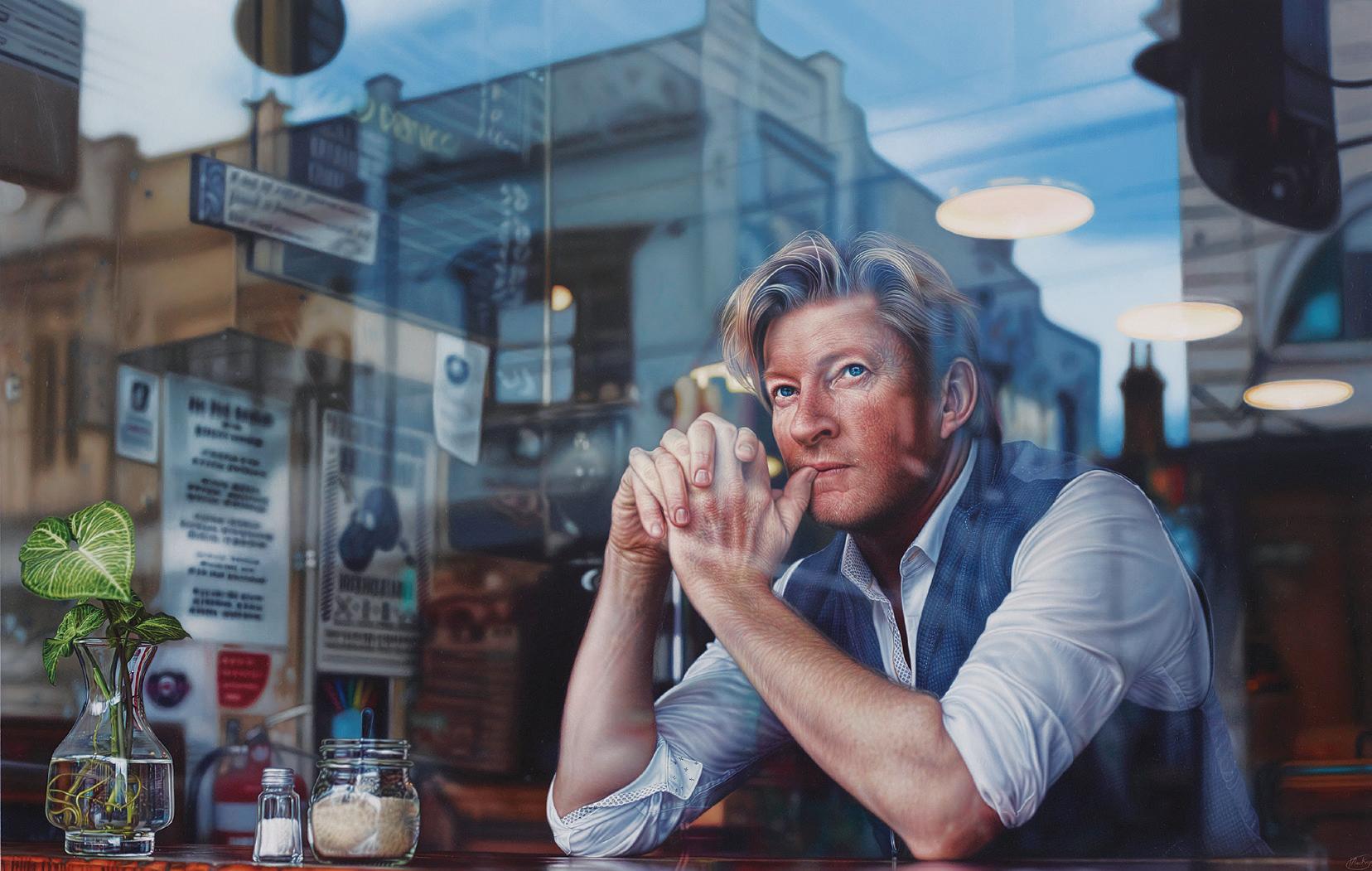
Sydney painter Tony Costa’s portrait of artist Lindy Lee may have won this year’s Archibald Prize but Tessa MacKay’s depiction of actor David Wenham gazing from the window of a Sydney café (winner of the Packing Room Prize) is the one stealing audience hearts.
The hyperreal portrait of a pensive Wenham, titled Through the Looking Glass, was one of the last portraits to be unpacked and an instant winner in the eyes of head packer Brett Cuthbertson. Mackay’s painting shows Darlinghurst resident Wenham within a Newtown
June is sale season across Sydney, so shoppers be prepared to get your wallets out. Moore Park’s Supa Centa is holding its annual June sale, with savings across more than 45 stores at the centre. A big bonus for family shoppers is Stay ’N Play’s complimentary baby-sitting for children over the age of three on June 1, 2, 29 and 30. Spots are available on a first in first served basis so, parents, get in early so you're free to shop and shop. supacentamoorepark.com.au
streetscape, not far from where he grew up.
The portrait is one of several by local artists to feature in the famed portrait exhibition this year. Others include Woollahra’s Karyn Zamel (My Self ), Edgecliff’s Sinead Davies (The Endocrinologist) and Paddington’s Laura Jones (Nakkiah in her Dressing Room).
More than 50 finalists are exhibited, whittled down from 900 entries. Art Gallery of NSW until September 8 artgallery.nsw.gov.au/prizes/archibald
Chicken legends Juicy Lucy are taking over the kitchens at Kingsford’s The Regent Hotel for a three-month pop-up. Lovers of the cult chicken cutlet can sample Juicy Lucy’s menu of chicken diner staples with an Asian twist alongside the pub’s usual selection of beers, wine and cocktails. Nightly specials including $15 Wednesday burgers promise wallet-friendly eats for all.
Juicy Lucy, a Surry Kills favourite, has gained a big following for its fried chicken with a difference. Worth the visit. regenthotel.com.au
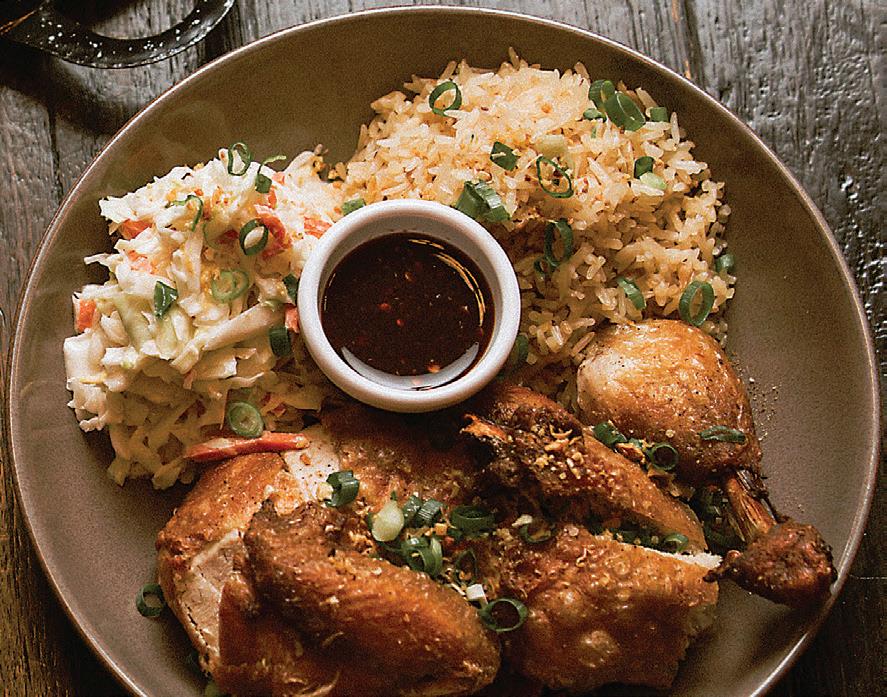
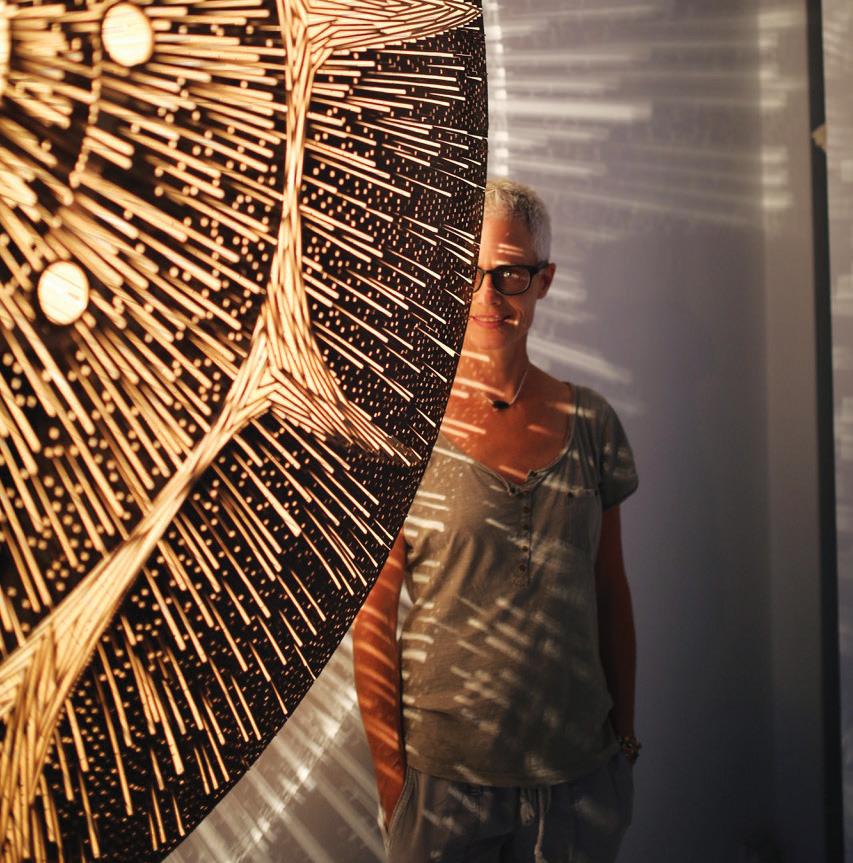
Fine art has arrived among the cafes and fashion boutiques of Paddington’s Five Ways, with the opening of Michael Commerford Gallery
The gallery, founded in 1986, and previously located in Double Bay, moved over summer to the new premises in the increasingly cosmopolitan retail and dining strip.
Owner Michael Commerford says the gallery will house the works of just three artists at any one time, to allow for an intense focus on the works of a select few.
The gallery is currently showing the extraordinary light sculptures of Reni Küng, a collection of intricate automotive sculptures by James Corbett, and Michael Commerford’s own most recent collection, the esoteric, playful wildlife pieces he paints under the name of Vayu.
Commerford says that the work of the artists, and their very different use of media, combine to form a unique gallery experience.
“Our works really complement each other in that they’re so different,” he says. “Seeing the different pieces together is a really engaging experience.”
Kung, Corbett and Vayu have all featured in exhibitions across the globe and attracted the attention of international, national and local art buyers.
Kung is best known for her matchstick walllight installation at Surry Hills’s famed Toko restaurant. Corbett’s sculptures, one of which is housed in the Sydney Motor Sport Park, are exclusively made from car parts destined for the scrap yard. He welds the salvaged pieces together — some from vintage cars dating back to the 1920s — to create intricate sculptures of animals and people. 219 Glenmore Rd, Paddington mcgart.com.au




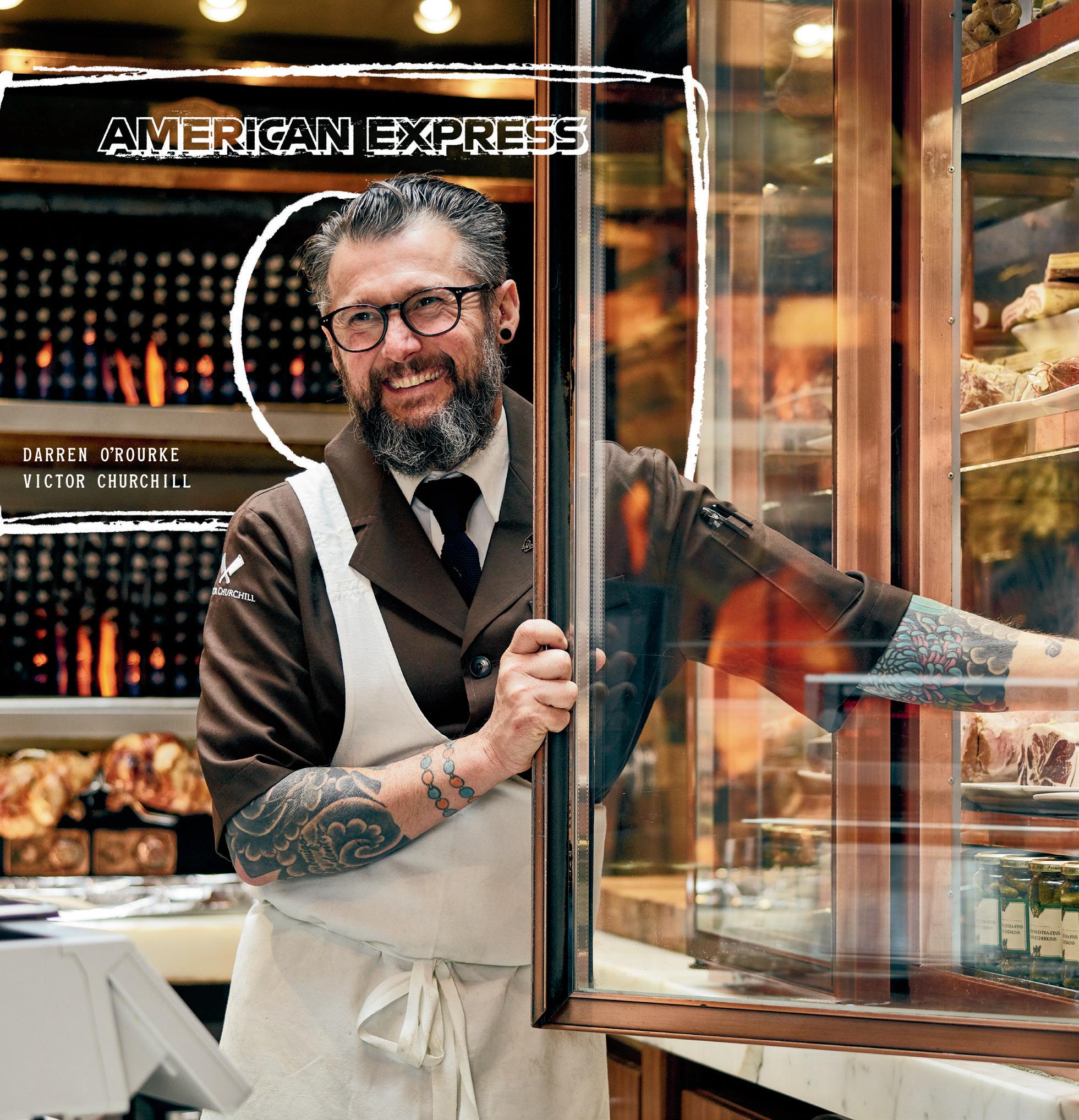



WALK INTO A PADDINGTON
STORE. No, this isn’t the set up for some elaborate joke. Rather, this unusual trio is among Belinda Everingham’s most devoted fans.
The reasons for the visit range from stubborn stain removal to the disappearance of a lifelong rash and a penchant for soothing balms, but these three strangers are united in their admiration of Everingham’s talents for Australianbotanical alchemy.
They’re by no means alone. Bondi Wash has bewitched customers with the beauty of Australian native scents since 2013. The Bondi mother-of-three cites Patrick Suskind’s novel Perfume, along with the evocative scents encountered on a holiday in Far North Queensland, as inspirations for the homegrown brand. If the French have been using their native flora to create heavenly fragrances for centuries, thought Belinda, why can’t the same be done with Australian natives?
And as it turns out, it absolutely
can. The opening of a store in Paddington late last year, following the original Bondi Beach flagship, speaks to our growing willingness to cleanse our homes, bodies and pets using our native botanicals. The store is a soothing, minimalistic sanctuary of blond woods and clean lines. It’s subtly reminiscent of a French perfumery but with an intrinsic Australian approachability.
“I wanted it to be calm, warm and inviting; a little like people might feel walking into my living room,” says Everingham, adding that the Bondi Wash staff have no sales targets to ensure customers don’t feel pressure to purchase.
It’s an uncommon concept in today’s competitive retail market, but Everingham’s faith in the exceptional quality of her range means she’s determined to ensure everything about the brand embodies that welcoming ethos. “Our stores should also be a place of learning if you’re open to it — with education and display of Australian native flora,” she says.
Stop by and you’ll leave armed with a little more knowledge. The

staff are only too happy to dispense samples and explain the native ingredients such as Tasmanian pepper, native lemon and emu apple that are used in products as diverse as the sensual sounding Wildflower Nights fragrance; salves such as the Purifying Night Balm for which Nigella Lawson returned in search of three jars; and the hardworking, best-selling bench sprays, dish wash, hand wash, and even dog wash.
Everingham hopes Bondi Wash boutiques will take Australian scents to the world. And while during her travels she takes note of streets she loves as part of plans for a future global presence, for now her focus is ensuring the business continues to delight schoolboys, mothers-in-law and celebrity chefs alike. “It’s not easy to create a brand with longevity that people love and trust. I’m focused on building a company that creates products people love, does the right thing, and hopefully will last a long time.”
76 Gould St, Bondi
396 Oxford St, Paddington bondiwash.com.au
BONDI WASH
Is the specialty shop back in style? For Lara Picone, the high street retains endless appeal. Here she delves into the philosophy of shopping and shares some of her favourite local stores

DESPITE OUR COMPREHENSIVE ADDICTION TO CONVENIENCE AT THE TAP OF A SCREEN, deep down we humans are tactile creatures. We enjoy running our fingers along fabrics and holding a garment up against ourselves as we contemplate its ability to enhance our style. We relish the interaction with fellow humans as we browse for nothing in particular. Sure, we’re also deer in the blue-hued headlights of online shopping binges and perpetually on-sale chains, but bricks-and-mortar stores still hold an undeniable allure.
Since its rather clunky inception in the early ’90s, e-commerce has swiftly become retail’s sophisticated, indispensible revenue stream, and it’s set to become the biggest retail channel in the world by 2021, according to Forbes. If you’re not online, you’re not anybody, goes the sales pitch. Many have decried the rise of e-tail as the harbinger of doom for IRL (in-real-life) shops.
time ensuring our store is constantly evolving,” says Jennifer Jones of Bondi’s Jones & Co, which sells upbeat homewares made by skilled artisans from its atelier-style shop. “Customers love to hold and feel the product,” she adds. “We encourage everyone to pick up every piece that speaks to them.”
Ainslie Curran, owner of the eclectic LoveDuck stores in Paddington and Bronte, says it’s her deliberate selection of unique products and a high level of service that keeps customers coming back. “It’s about surprising and delighting, and unique service. You don’t find that at many malls,” says Curran, adding that LoveDuck is growing every month and she can’t wait to expand.
It’s about surprising and delighting, and unique service
But rather than signalling the end, e-commerce, malls, and fast-fashion stores in fact heralded a period of (sometimes shaky) transformation for the local shop. Stores had to up their games. And now we’re seeing boutiques that are as experiential as they are beautiful. Retail interior design and styling has become a source of inspiration, not merely function, and the collections are superbly curated to catch even the most sales-weary eye.
“There is amazing power in merchandising and keeping your store looking fresh. We spend a lot of
Jennifer Jones agrees that service is what makes traditional retail stand out. “You need to provide more than just the products. It goes down to the minute details. We go the extra mile in creating the best customer experience. We know most of our customers by name and we also know their kids and their dogs, too.”
Echoing Curran’s assertion that a unique offering is key, elegant, tailored boutiques have been flourishing once again. Some are new, and some have surfed the tidal wave of malls and e-tail to glide ashore intact, but all offer a refreshingly edited alternative to the exhaustive scrolling through the infinite options online. We check out a few in our neighbourhoods.


The original Surry Hills boutique now has outposts at Paddington and Barangaroo featuring everything from fashion to bedding, homewares and skincare. Be warned: it’s hard to leave this elegantly curated store empty-handed. collectorstore.com.au
Saskia Havekes's floristry talents have made this Potts Point florist a fashionable favourite for artisan bouquets. Blooms spill out onto the



Macleay Street footpath in what is always a pretty evocation of Paris. grandiflora.net
Take Scandinavian minimalism to the next level and admire the Danes’ exquisite craftsmanship at this inspiring Paddington store. The classic Nordic silhouettes and materials that inform the furniture, lighting and homewares here bring a sense of calm and order. greatdanefurniture.com
Beware of stepping into this cosily lit Bondi Junction bookstore, for it may be a few hours before you emerge. Harry Hartog’s beautiful

selection of books will ignite a love of reading in anyone. The scent of paper promises adventures untold, all awaiting discovery. harryhartog.com.au
Jennifer Jones does a great line in gorgeous at this cute-as-a-button Jacques Avenue, Bondi, outlet. Pop in for conversation or the occasional class and pick up some feel-good ceramics and other homewares that you won't find elsewhere. jonesandco.com.au
This beautiful little store dedicated to all things paper — from print magazines to journals, greeting

cards and notebooks — is an open invitation to browsing and reconnecting with a pre-digital life. journals.net.au
The muted tones, natural textures, and minimal embellishment of MCM House’s collection encapsulates the type of laidback luxe we covet for our own homes. Come for a standout piece or deck out your whole abode in MCM’s cool, casual aesthetic. mcmhouse.com
Parlour X’s home in an historic gothic-style sandstone church is indeed a place of worship for
fashion fans who come to pay homage to high-end designers such as Isabel Marant, Chloé, Loewe, Celine and Valentino. Keep an eye out for their sales, when you can pick up a very good buy. parlourx.com
Shipments of antiques arrive regularly from France, making Parterre the place to go for covetable one-off pieces, but also for the contemporary furnishings with which to style them. This Woollahra landmark of three decades standing proves the appeal of the immersive bricks-and-mortar store experience is still sought-after. parterre.com.au
PLAYA
BY LUCY FOLKThe musk stick-pink interiors of this Bondi store means it could easily pass as a sweet shop at first glance. But inside you’ll find treats in the form of its namesake designer’s whimsical and playful pieces in both jewellery and accessories du jour. lucyfolk.com
If it’s on-trend, it’s at Tuchuzy. This Bondi stalwart is a one-stop shop for cool-girl essentials, dressing the fashion-forward for years with labels such as Rag & Bone, Bassike, Faithfull, and their own brand of current staples, Chosen. tuchuzy.com
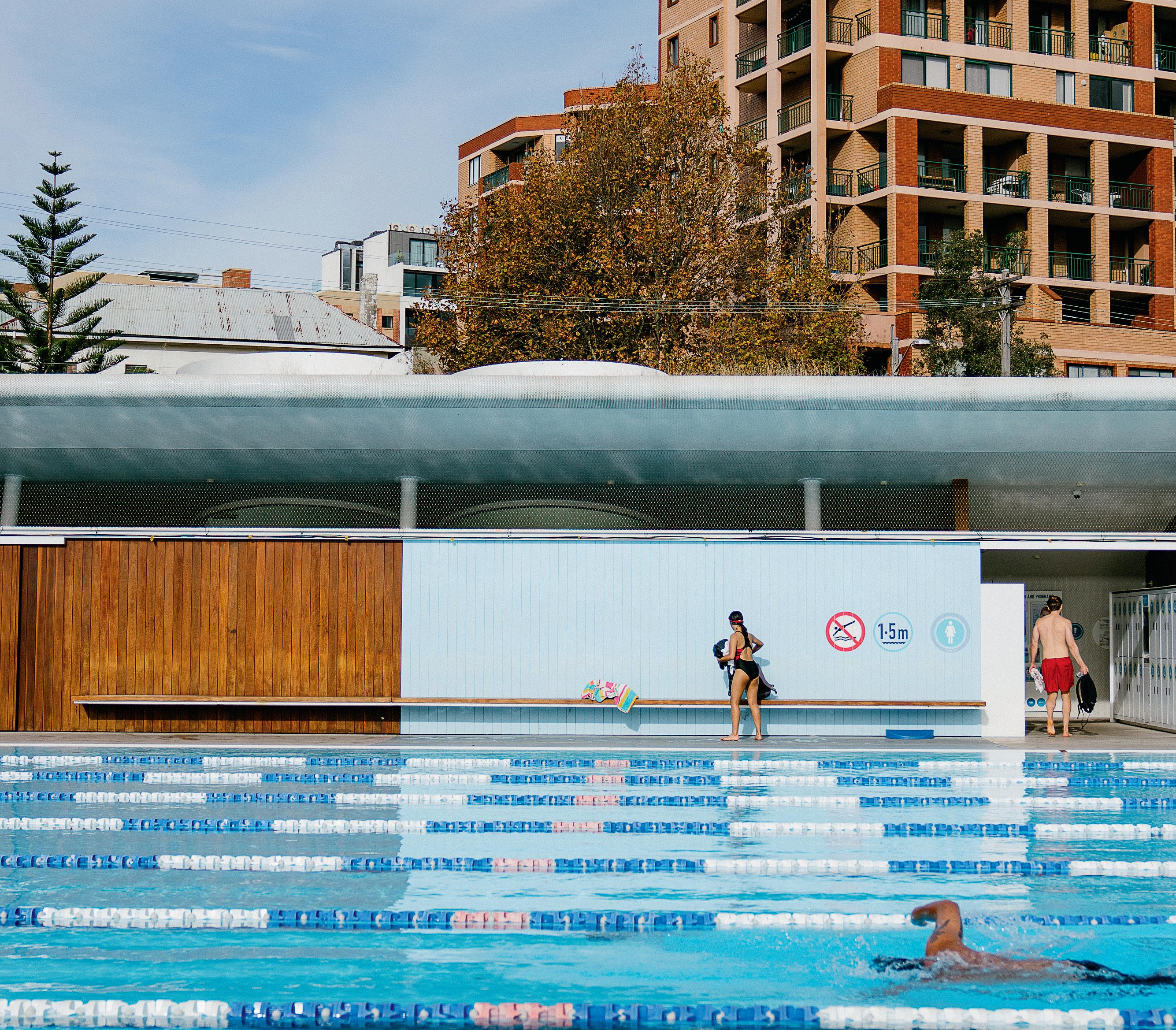
Brace against the cold with warmer water temperatures at this reborn inner-city landmark, writes Caroline Clements. Images by Dillon Seitchik-Reardon
IT’S JUST AFTER 7AM ON A CRISP WEDNESDAY AND IT'S PEAK HOUR AT PRINCE ALFRED PARK POOL. Regulars set the pace with strokes up and down the 50-metre blue and white roped lanes. On the sidelines, lifeguards put out signage for fast, medium and slow swimmers. Steam rises up over the pool as patrons undress on the sidelines. Warm feet hit cold, cold concrete; cold air hits bare chests. There’s a similar thing happening at pools around the country at the exact same time today.
While many take a break from the water at this time of year — opting instead for warmer, indoor
pursuits — a committed group of swimmers simply pull on an extra cap and dive in.
This celebrated public facility is at the edge of central Sydney, on the border of the city and Surry Hills. At peak hour it’s an ode the Australian psyche — a meeting point, a melting pot, a place to exercise and socialise. It’s hard to imagine it wasn’t ever here; it feels so much a part of the green urban landscape of its surrounding park.
In 2013 a major overhaul was completed, reinvigorating the park and upgrading the tired public pool, with a mission to prioritise landscape over built form. The

building previously at the centre of the park was removed and the landscape opened up for the reinvigorated pool, a monumental engineering and design feat realised by Neeson Murcutt Architects and Sue Barnsley Design.
The park was given a completely new sensibility, thanks to a piece of folded landscape with a green roof covering the main building. The people were given a glorious new pool (with skylit change rooms and a poolside cafe beneath two sweeping mounds of grass), while the blue striped concourse, yellow umbrellas and coloured chimneys add a touch of
playfulness to this facility from the City of Sydney. It’s a far cry from the original pool at Prince Alfred Park built in 1954, with an ice skating rink that was added in 1959 (fun fact), only to be demolished in 1996.
Nowadays, when ocean water gets too cold (for some), and other public pools close for the winter months, Sydney swimmers relocate to this inner-city landmark near Sydney’s Central Station. The water at Prince Albert Park Pool is heated through winter, maintaining a balmy temperature of 25.C — it’s warmer inside the pool than out.
Regulars here revel in the
A good coffee after a morning swimming is par for the course. If you’re moving through on your way to work, a stone’s throw from the pool is Haven Speciality Coffee. These guys are serious about coffee. Their food menu is highly crafted too, with an Asian twist.
34 Chalmers Street, Surry Hills
A short stroll through Prince Alfred Park past the basketball and tennis courts and over into Chippendale is Brickfields. This small corner cafe and bakery has a regularly changing menu of hearty salads, sandwiches, and pastries, and a famous seeded sourdough ciabatta. The bacon sandwich hasn’t left the menu since it opened in 2012, which is a telling sign.
206 Cleveland Street, Chippendale
The Norfolk is a go-to for almost any situation. This transformed Redfern boozer is a good spot for a drink after your swim. It’s fun, friendly, a little rowdy, and there’s a beer garden out back. It ticks all the right boxes for a Sydney pub.
305 Cleveland Street, Redfern
hours when crowds subside and you get a lane (almost) to yourself on an unexpectedly warm afternoon, an icy winter’s morning, or about 10am on a weekday (the golden hour). But a busy, early morning swim is, without a doubt, one of the best and most pleasurable starts to the day you can get — no matter the season.
Prince Alfred Park Pool
105 Chalmers St, Surry Hills
Opening hours 6am-7pm
Dillon Seitchik-Reardon and Caroline Clements are Places We Swim. Follow them @placesweswim Buy the book placesweswim.com


There are few restaurants in Sydney that can genuinely lay claim to the title of icon, but Chinatown stalwart Golden Century is certainly one of them. So news that the GC is about to open a new venue in an impressive new CBD building will fill food lovers with anticipation.
XOPP by Golden Century launches at the new The Exchange in Darling Square this winter with a name that pays homage to the restaurant’s most famous (and delicious) dish, pippies in XO sauce.
The restaurant will be in the safe hands of Billy Wong, the son of the mothership restaurant’s owners, Eric and Linda Wong.
“People always have traditions and stories about dining at Golden Century, whether to celebrate family and friends’ gatherings, birthdays and milestones, or after concerts or late nights out,” Wong says. “We want XOPP to be a place where more memories are created and shared.”
The menu will, like the original, be Cantonese focused, and there will also be a bar with smaller dishes and “experimental snacks”.
The restaurant will be housed in the amazing new The Exchange building, designed by acclaimed Japanese architect Kengo Kuma. The building is wrapped in almost 20 kilometres of timber and will also be home a raft of other offerings including a new City of Sydney library. goldencentury.com.au


Finding a balance between life, work, health and time off can be tough, so it will be interesting to hear how leading young Sydney women do it, when they present a sequence of evening chats at the Paddo Inn this winter.
The first event, entitled Finding The Balance, kicks off on June 4 (so get your tickets quick), with journalist Elle Halliwell hosting a panel that includes health and fitness personalities Sally O’Neil (The Fit Foodie), Lyndi Cohen (The Nude Nutritionist) and Ellice Whichello.
Halliwell was diagnosed with cancer when she was pregnant with her first child, and having overcome that, now juggles a busy life of media and motherhood commitments.
The Paddo Talks series, presented in conjunction with Veuve Clicquot, continues in July and August, with more panellists and hosts to be announced soon (watch these pages). Tickets are $55 and include Champagne and canapés. The open-forum format is designed to encourage discussion and interaction between the panelists and guests.
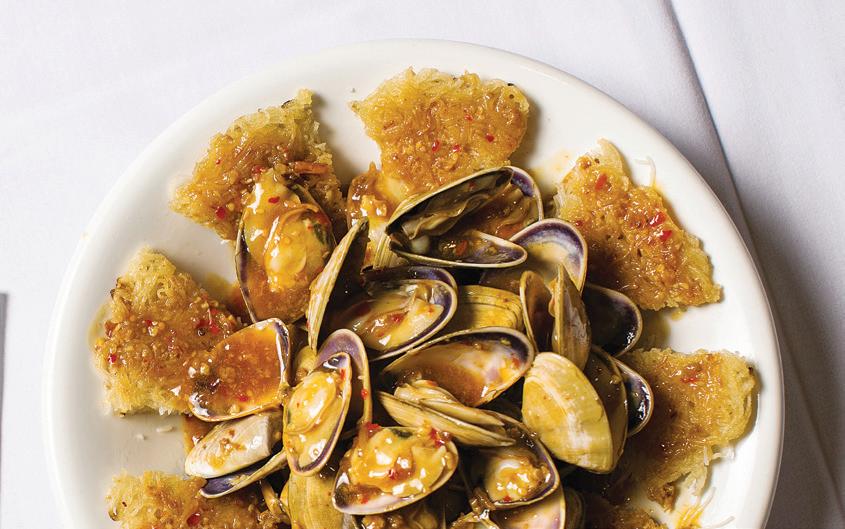
paddoinn.com.au/inn-talks

23-33 Mary St, Surry Hills 8204 0800 firedoor.com.au
Tasting menus: (lunch) $90 (dinner) $150
A la carte: $8-$184
Out of the blue, the restaurant unexpectedly found itself on the front page of The New York Times, complete with a picture of chef Lennox Hastie slaving over his wood-fired oven, in a piece of glowing editorial written by Times food critic Pete Wells.
Wells was in town following an extraordinary piece of junketeering by Tourism Australia and Visit Victoria, who jetted food identities into Melbourne in a bid to convince them the food capital of the Southern Hemisphere resided down south. Wells found his way to Sydney anyway and put Firedoor on his list of venues with chefs whose cooking had “global origins, cosmopolitan sensibilities, or both”.
Two years later the effect of that piece on the restaurant is nothing short of profound.
Walk into Firedoor on an early weeknight and find a buzzing room full of diners, including a handful of Americans. The old communal table that dominated the room has gone, freeing up the energy flow. Excellent waitstaff glide about confidently. The music is louder, cooler, more joyful. In the kitchen Hastie remains a forceful presence, working up a sweat over fire and coals.
This month sees the introduction of two new menus to complement the usual a la carte offering. At night there’s a chef’s tasting menu — an exploration of the Firedoor lineup — for $150, and on Thursdays and Fridays find a five-
course lunch tasting menu for $90. Both represent outstanding value for food as genuinely original as this.
The evening menu starts with a sequence of dishes that combine incredible Australian produce with Hastie’s signature technique of cooking exclusively over fire (there are no electrical appliances in this kitchen). Start with a delicate winter broth, followed by a knob of earthy, smoked burrata, and move onto some of the night’s early showstoppers: a quirky shish kebab of seared kangaroo interlaced with white onion on skewers presented on a bed of pine needles; then a huge daube of absolutely fresh sea urchin nestled on a disc of flatbread beside smashed pumpkin, followed by a tart dish of mackerel with finger lime and wasabi. Each dish is rigorously composed, delicious, and gorgeous to the point of theatrical.
Then comes a plate of sweetish cabbage with mussels, outstanding wood-fired bread, Murray cod with charred cos, and, the big one, a portion of wagyu with radish and tomatillo that shows a next-level mastery of meat cookery, the flesh soft, buttery, with smokey, charred flavours. A line of deserts includes a rum baba that is set alight at the table, for a playful finish.
It is a magical thing to see a restaurant with a lot going for it reach its full potential. At Firedoor it’s as though the international recognition Wells bestowed upon it was the fillip needed to bring a new sense of confidence to the room. Firedoor is, well, on fire.
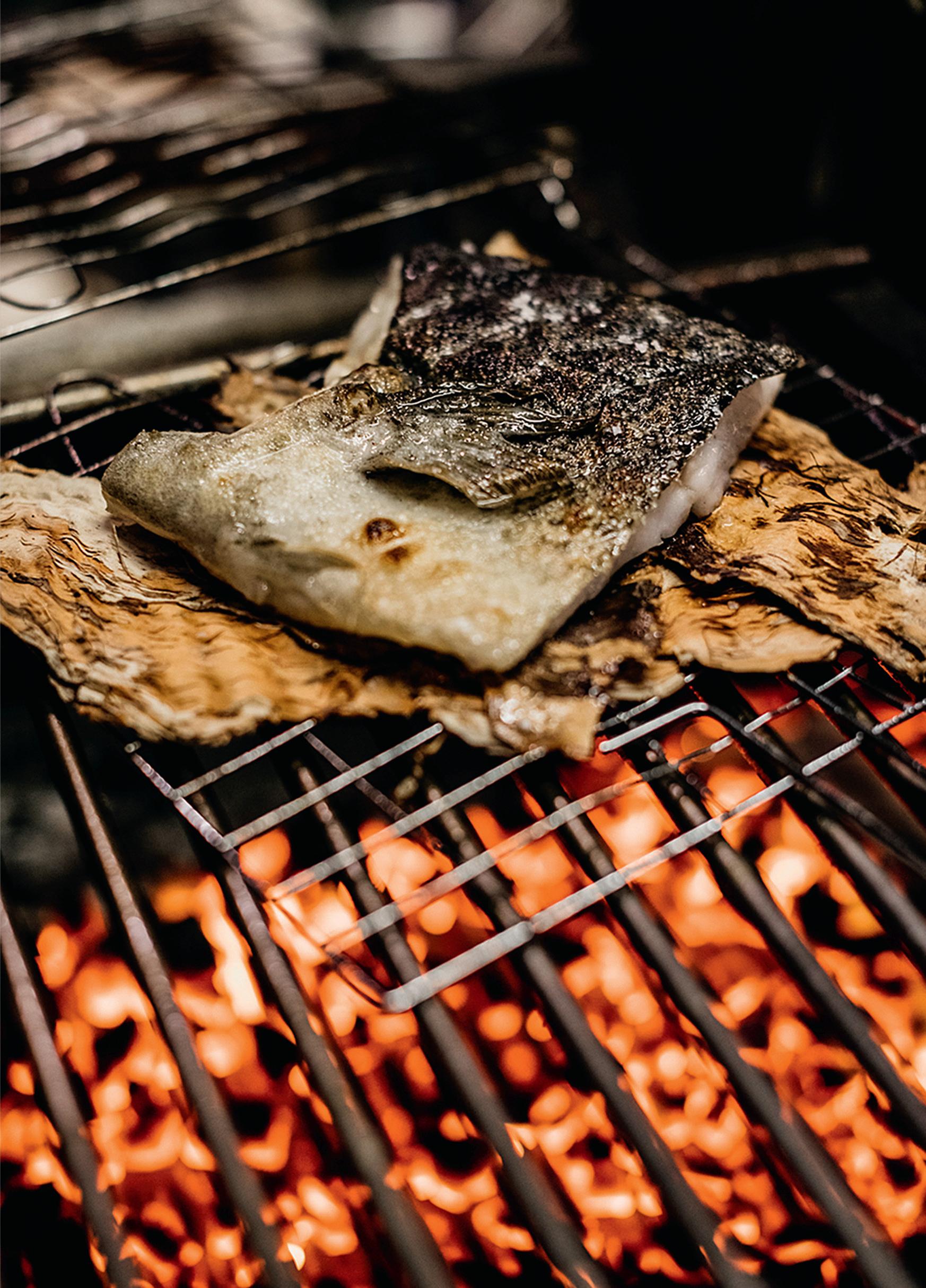
INGREDIENTS
• 1 pork cutlet (bone in, roughly 400g)
• 10 pippies
• 1 bunch rapini (washed, stalks trimmed)
• 200g barley
• 300ml brown chicken stock
• 100g smoked bacon skin
• 35ml red wine vinegar
• 2 sprigs of thyme
• 1 clove garlic, skin on, crushed
• 1 bay leaf
• 200g chilled butter
• canola oil
*** giveaway ***
In conjunction with The Unicorn Hotel, Local East is giving away dinner to the value of $120 at the hotel
To win, simply email us some feedback on anything in this month's magazine, or mention the giveaway on our instagram feed. The best correspondence will be published next month.
1Take the pork out of the fridge, season and leave to reach room temperature.
2 Put the stock, bacon skin and bay leaf in a pot, bring to the boil and simmer for 10 minutes, skimming any impurities that come to the top. Once done, leave the skin and bay leaf to infuse.
3 In a separate pot, bring salted water to the boil and after rinsing, add the barley and simmer for 15 minutes or until tender, then drain and leave to one side on a tray.
4 Once all this is ready, place a heavy based pan onto the stove, rub the pork with oil and place in the hot pan. Depending on the thickness this should take about five or six minutes on each side. It should have a dark golden colour and be firm to the touch with a slight give.
5
When the pork is nearly ready add the 100g of butter, the garlic and thyme and baste for the final two minutes of cooking then transfer to a plate to rest.
6 Strain the stock and reduce it by a third. Add the pippies and rapini and cover for three minutes to steam them open.
7 Finish the sauce with the vinegar and the cold butter, stirring constantly to ensure it emulsifies into the stock.
8 To serve, take the pork off the bone and carve into thin slices and season with salt flakes.
9 Put the barley and rapini onto the base of the plate, then the sauce (which will warm the barley), then place the pork on top and garnish with the pippies.

Rory Kinsella didn’t set out to spend a year on the wagon. But after an epiphany in Mexico, he found himself unapologetically and altogether sober
THROUGH THE FLICKER OF CANDLELIGHT I SEE PENS HOVERING ABOVE NOTEBOOKS. It’s a couple of hours before midnight in 2017 and our retreat leader in Mexico has asked us what we want to leave behind as we move into the new year.
Later we crowd around a fire and ceremonially cast our bad habits into the flames. Some mumble theirs to themselves, others exclaim theirs loud and proud as if in hope the group will hold them to their pledges.
What I throw in the flames is “materialism”, a habit of buying and obsessing over unnecessary things. But a couple of months later, it became clearer to me — that the
biggest thing I was actually leaving behind was alcohol.
I didn't set out to do a year off booze. I did it for a week at the retreat, but that week made me feel so good that I decided to extend it into a Dry January. From there, it seemed natural to go to 100 days, then my competitive streak kicked in and I wanted to see if I could do six months … then a year.
It certainly helped to approach it in small chunks. The prospect of a whole year without a drink, when I’d barely gone a week for the previous 25 years, would have been far too daunting to contemplate.
But why quit? I’d rarely been a daily drinker. I was more of a binge drinker, but had come to the slow realisation that the downsides were outweighing the upsides. In my twenties, it was all carefree debauchery with little more than a sore head the next day. But by my late thirties, the hangovers were becoming longer and more soul destroying. The real kicker was that I wasn’t even enjoying being drunk any more. Rather than getting a buzz, it was bringing me down. It was as if after all these years, my body had finally cottoned onto the fact that alcohol is a depressant.
Since I was a teenager, alcohol had played a central role in my social life, as it does for many people. Dinners, catch-ups, ski trips with a heavy emphasis on the après,
music festivals where the music came a distant second to the partying, all centred on the notion that a few drinks were requisite for a good time.
When I’d attempted a month off in the past, my rubber arm was always my undoing. Perhaps it was fear of missing out or an inbuilt aversion to being different. Either way it never took long to be successfully talked into a drink.
This time it was easier to say no because I didn’t feel I had to apologise. I read somewhere that alcohol is the only drug you have to apologise for not taking, but when you commit to your decision not to drink, people have less of an invitation to try to change your mind.
An Australia Day boat party and having to do karaoke sober were among the hardest moments, but after the initial awkwardness, I soon started to enjoy things. You don't need alcohol to talk to people you don't know — you probably do it at work all the time. You don't need alcohol to get on the dance floor or sing karaoke; you just need to decide not to take yourself too seriously. Dutch courage is nothing but a placebo.
There are many well-documented health benefits to life without booze, but for me, the most obvious benefit has been an even mood across the week. No ups and downs depending on whether I’ve had a big weekend. This hugely improved my productivity and meant I could spend time relaxing rather than recovering. Cutting out the one hangover day a week gave me back a full 52 functional days when I didn’t need to order multiple Uber
Eats just to get through. I also saved a small fortune in drinks and taxis.
As a year ticked around people asked me how I was going to celebrate my first drink.
There have been no ceremonial pledges this year, but I still have no desire to drink and can’t see it happening again soon. To move forward in life, we sometimes have to give up old habits to make way for new behaviours and experiences. Alcohol is neither entirely good nor bad, it’s something we each have a relationship with and we’re all at different stages of that relationship. My advice would be that if you feel you’re at a turning point in your relationship with alcohol, don’t shy away from changing things up. It’ll be easier than you think and the benefits will be greater than you imagine.
Rory Kinsella is a writer and meditation teacher based in Bondi Junction. rorykinsellameditation.com

Libraries aren’t the dusty, daggy dungeons they once were. Lara Picone revisits some old haunts and uncovers a fresh world of books and beauty




IT HAS BEEN MORE THAN 16 YEARS SINCE I WAS AN ACTIVE MEMBER OF A LIBRARY. Back then, I was a Berocca-fuelled university student punishing my hungover mind with Michel Foucault’s Madness and Civilisation under interrogating fluorescent lights. Now, as I slip my shiny new library card into my wallet, I’m a caffeine-dependant grown woman cradling a nine-month-old baby and clutching a copy of The Pigeon Finds a Hotdog
Life’s changed. But in that time, so have libraries. Although still centres for mind expansion and safe havens for shy, bookish teens, libraries are no longer the papermite-ridden strongholds of tweed, turtlenecks and lethargic dial-up internet. Today’s libraries are beautifully designed, light-flooded spaces that invite the world in, rather than shushing it with a stern tone.
Sydney is well onboard with this new kind of library. One, that despite an increasingly digital world, is even more relevant today than pre-Google. Walk into Woollahra Library at Double Bay, where you’ll see children whizzing down a slippery slide and students quietly engrossed in literature among the leaves of the indoor garden, and it’s clear libraries are much more than books and microforms.
Here, an open amphitheatre design, white spaces and clever, quiet alcoves stretch across three levels that escalate in serenity. Since its relocation from Blackburn Gardens in 2016, the Woollahra Library has more than doubled its membership. It’s a space designed to welcome the community at any stage of their life, from students to new mothers and retirees.
“We designed Woollahra Library at Double Bay to be a place beyond books. It’s a community hub where people come to meet, connect, work and learn, as well borrow from our collections,” says manager of Woollahra Libraries, Vicki Munro.
Indeed, as I bounce my baby along to Rhyme Time songs in this uplifting space, sitting among other mothers in various states of sleep deprivation, I feel less burdened by the often-lonely, wonderful tedium of nurturing an infant. Here are women I may never have met, if not for this library. We’ll borrow some books, sure, but it’s making these connections and inciting a love of literature in my tiny son that has brought us here today.
Since reintroducing libraries to my life, I’ve been touring local branches, from the sleek, sustainable, glass-walled Surry Hills Library to the brand-new Green Square Library. “Public libraries are important social and cultural places for people to expand their understanding of the world in which we live. They’re places for people to be together, even if they are doing their own thing,” says Heather Davies, City of Sydney’s manager of libraries and learning.
In a world where we are simultaneously more connected yet more isolated than ever before, intuitively designed libraries are drawing people back together. And it’s not just happening in Sydney. This renaissance is a global movement with incredible architecture and
WOOLLAHRA LIBRARYinterior design making for some truly awe-inspiring and, of course, Instagrammable spaces. This is evident in Germany’s Stuttgart City Library by Yi Architects with its comprehensively white, minimalist design; Denmark’s colourful Hjørring Public Library; and Canada’s Halifax Central Library with its precarious-looking fifth-storey glass cantilever hanging over passersby.
While there are incredible libraries, old and new, the world over, Munro says they also looked locally for inspiration when designing Woollahra Library, such as those at Surry Hills, Castle Hills and Brisbane City.
“It’s been particularly heartening to see the investments made in library infrastructure in Australia and other countries in recent years,” says Davies. “Building new or refreshing existing buildings helps libraries adjust to changes in service needs and brings in new people for a look, many of whom join up while they’re there.”
This is certainly the case with Green Square Library and Plaza, which last year beat libraries the world over to take out the Architectural Review Library Award. Its subterranean design with plaza-level glass pyramid and skyward-reaching tower, complete with a socialmedia friendly rainbow reading wall, is proof that musty, labyrinthine libraries are disappearing down the returns chute, along with stereotypes of bifocalled biddies with greying buns.
“Libraries can be the visual anchor. Beautiful design
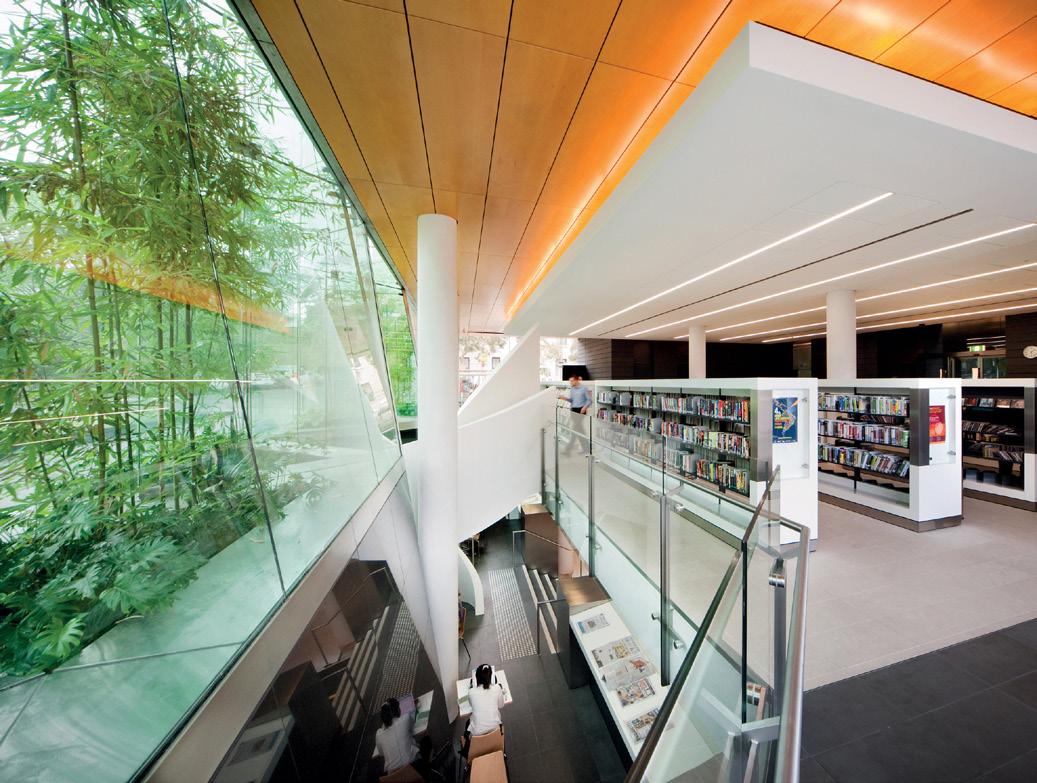
make people proud of this public asset and create a sense of ownership,” says Davies.
At Green Square, study groups lounge in the sun on tiered wooden seats, teenagers self-consciously thumb through ’zines, bookclub ladies sip lattes in the cafe, and grandparents read softly to their young charges in the colourful kids' space.
The modern library may have profoundly changed, but like its predecessors, it’s still here for you, no matter your age or stage in life. As Davies says, “Libraries have always been the place to go to learn, and you will always be a different person coming out of the library to the person you were when you went in.”
Even if it has been 16 years since you last visited.

Local residents and their architects, planners, builders or consultants are
to nominate residential or commercial buildings within the Woollahra local government area.
before 21 June.
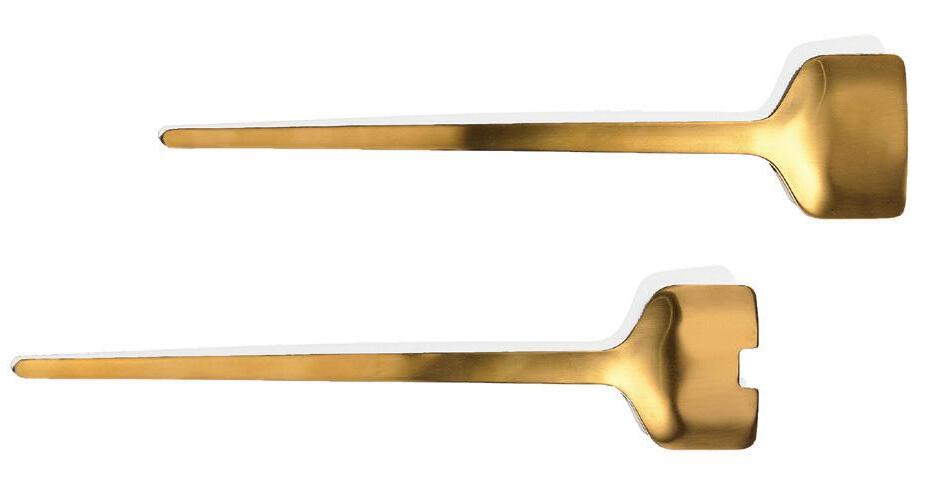

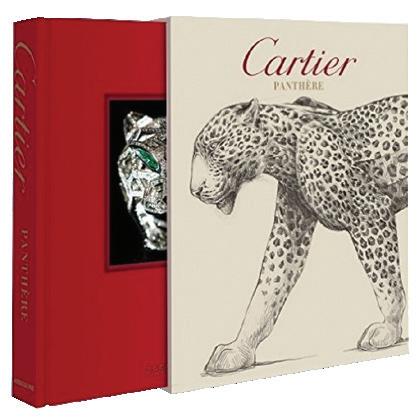


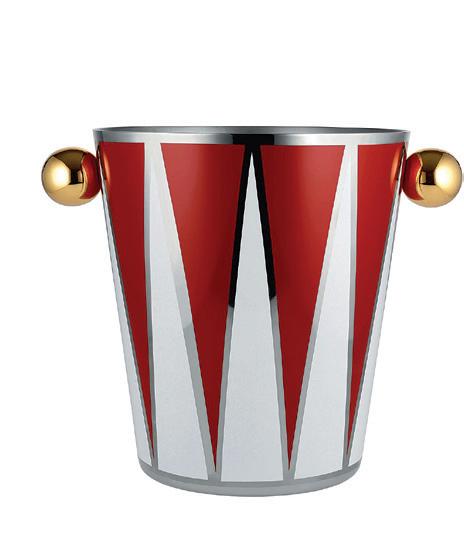
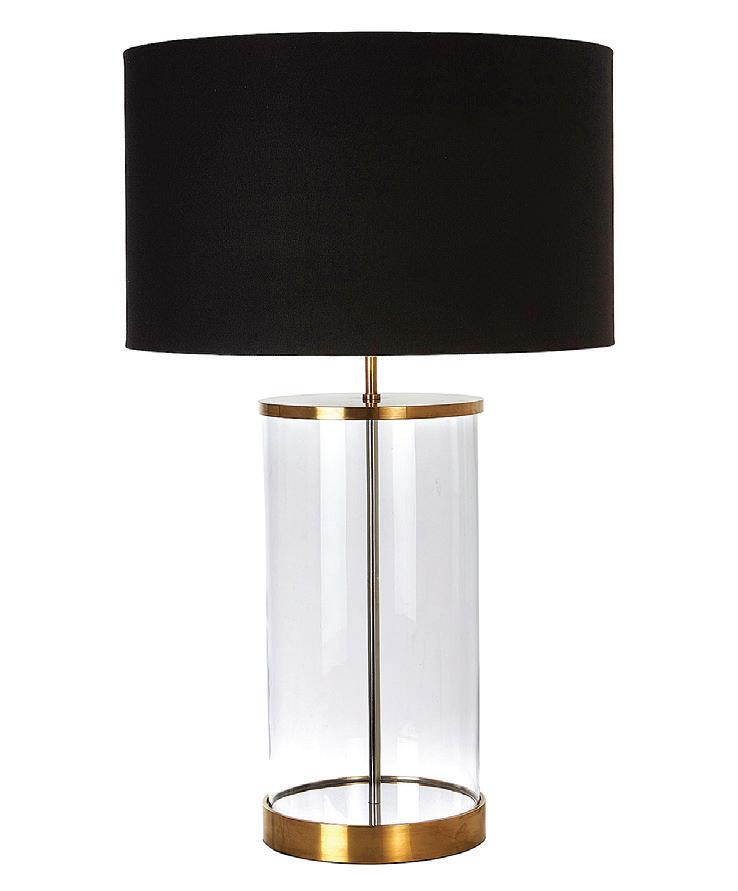

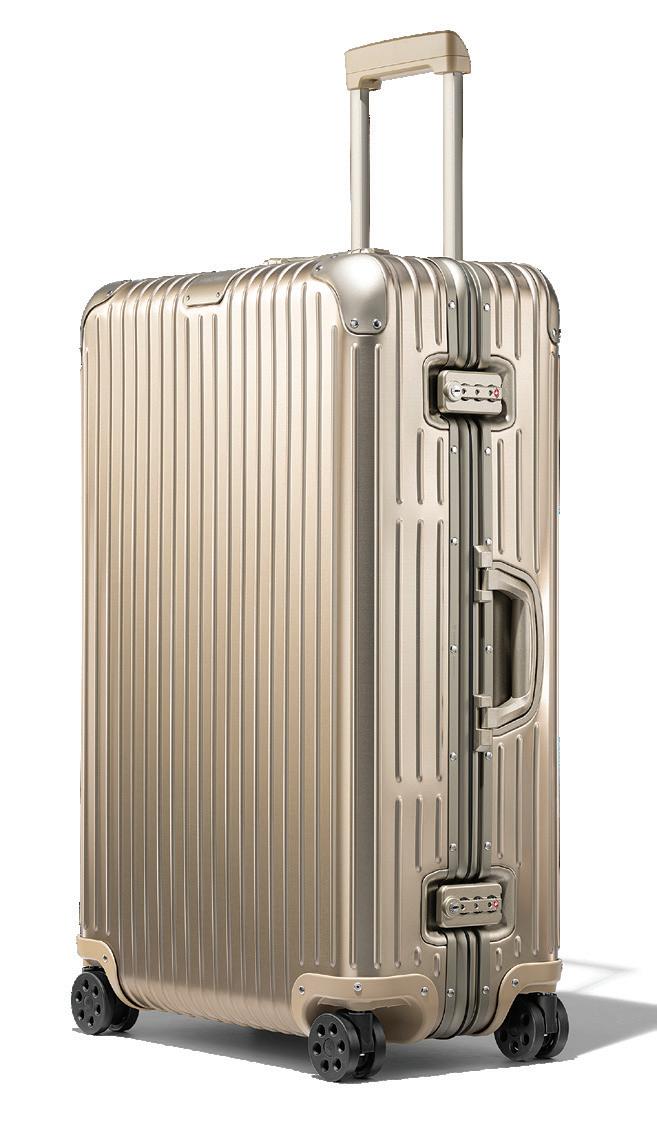

Your space says as much about you as your fashion choices. Fortunately the East is the city’s spiritual home of interior design so hit the area’s big-ticket showrooms and boutique gems for your own stylish statement.



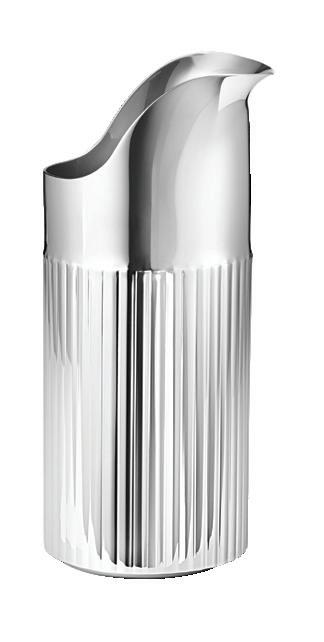
 ALEXIA BIGGS INTERIOR STYLIST
Ralph Lauren Sophie backgammon set $1350, palmerandpenn.com.au
Cire Trudon room fragrance in Odalisque $299, robertburton.com.au
B&B Italia Eda-Mame by Piero Lissoni lounge $11,465, spacefurniture.com.au
Seletti Hybrid Isaura dinner plate $99, designcasa.com.au
Missoni Home Stephen #100 bathrobe $526, spenceandlyda.com.au
ALEXIA BIGGS INTERIOR STYLIST
Ralph Lauren Sophie backgammon set $1350, palmerandpenn.com.au
Cire Trudon room fragrance in Odalisque $299, robertburton.com.au
B&B Italia Eda-Mame by Piero Lissoni lounge $11,465, spacefurniture.com.au
Seletti Hybrid Isaura dinner plate $99, designcasa.com.au
Missoni Home Stephen #100 bathrobe $526, spenceandlyda.com.au

A local duo is behind a new luxury linen range that aims to maximise sleep by minimising toxins, writes
LINEN, says Georgie Cavanagh, one half of new local bed-linen label Carlotta + Gee.
Sheree Mutton
“A lot of people are already converted linen lovers when they hear about Carlotta + Gee, so they just get it,” Cavanagh says. “The others that don’t are keen to try once they understand the benefits of it, given the material helps stimulate blood flow. Once they try, then they are hooked.”
The Carlotta + Gee business story is the stuff of dreams. It’s the tale of a dynamic young duo with a great idea who swiftly built a solid following for their brand.
Things started 18 months ago, when the Paddington flatmates returned from a trip to Byron Bay with a plan to create their own line of luxury linen.
“We started to discuss linen bedding and the feeling you have when sleeping in it,” says Cavanagh. “You could instantly see our eyes light up talking about it. That feeling!”
From the beginning, the pair
knew what they wanted to develop — beautiful, quality linen without an expensive price tag. So they consulted Casals's mum, who is a well-known interior designer back in Carlotta’s native Spain.
“Mum has contacts in Normandy, France where the linen is grown," says Casals. “We started conversations with them, receiving samples weeks later and once we saw the unbelievable quality, we knew this was falling into place.”
Within weeks of launching Carlotta + Gee, the pair started receiving order after order. One year on and the label has a dedicated following. There are currently 13 colourways available in doona covers, flat and fitted sheets, European and standard pillowcases, with prices ranging from $75 to $240. Each piece comes in a cute linen tote bag featuring the words bonne nuit (good night in French). The gorgeous earthy tones reflect the growing brand’s commitment to sustainability.
“It was important to us that there was no wastage when
growing our linen,” says Casals. “In France, the flax plant is maximised — from eating the flax seeds to using the flax oil for varnishing furniture. As you are in bed for one third of your day and surrounded by other toxins daily, we did not want any to be in your bed.”
The brand has received the tick of approval from A-list actor Matt Damon and his wife, Luciana.
“Our bedding is stocked in Liberty Trading Co in Byron Bay where they visited,” says Cavanagh. “After touching and feeling the quality, they put in a large order to re-do their house in Los Angeles.”
Yet the linen isn’t only for the wealthy. The founders want their products to remain accessible and affordable for everyone.
“The whole reason we started Carlotta + Gee was so you didn’t need to mortgage your house or add it to your bucket list before purchasing,” says Cavanagh. “Great quality at an affordable price it is an investment which will last a long time and after all what is more important than investing in your sleep?”
carlottaandgee.com
KING LIVING
The pioneering furniture brand’s head of product on the enduring nature of a well-designed chair

David, tell us about something you’ve seen recently that has inspired you?
I recently attended the Salone del Mobile in Milan. B&B Italia were celebrating the 50th birthday of the iconic Up 50 chair and ottoman. This chair encapsulates all the ingredients of great design — unique yet still highly relatable with its anthropomorphic-inspired form and innovative production technique that pioneered the use of moulded foams. This was in its infancy in the late 1960s when the chair was first released.
Is there a piece of furniture you feel is dominating trends this year?
Occasional chairs generally have dominated my interest. They can be such important pieces in a room and the value of a truly beautiful and comfortable chair can’t be underestimated. They allow for a greater range of materiality to be brought into a piece, combining natural elements such as soft moulded timber or metal components juxtaposed against luxurious soft upholstery. You can also take a bolder approach

to covering by utilising patterns or bold colours.
Describe your professional style and ethic. What’s your approach to designing pieces of furniture? As a designer you have a great responsibility not to “just add to the mess”. So much furniture is developed, manufactured and discarded each year on account of poor quality, functional obsolescence, or changes in trends. At the heart of the King design ethos is to produce high-quality furniture built to last, timeless in style but to also have a unique quality about it, whether it be form or function, to ensure there’s a strong argument for its reason for being. The customer is always at the core of our design discussion and decisions centre on tangible benefits.
What is it your customers are wanting right now?
Traditionally King has been known as a designer and manufacturer of great sofas, yet now we’re seeing a great appetite for our new furniture categories. We’ve just released a new lighting range, Solifiore, developed in collaboration with
Australian designer Charles Wilson. A new range of rugs has also been very popular, with a focus on great colours and textures that have been developed specifically to work with our sofa range and fabric and leather colour ranges. Customers are wanting the complete story really and we’re constantly developing product in these categories to fulfil the demand.
Tell us about a project you’ve been working on?
We’re working on a new modular sofa concept inspired by some of the early modular sofas King was producing in the 1980s. We are also gearing up for the official release of the ETO desk and table series. ETO is a unified desk designed to appropriately consider how people work today. It is the first desk in the world to offer interchangeable lighting and charging accessories, and considers how people truly work and live. The ETO desk integrates power, wireless charging and lighting seamlessly into one sophisticated minimal design allowing people to truly customise the table to suit their needs. kingliving.com.au
Not many equate Kings Cross with calm. But it’s where you’ll find this soothing bolthole ideal for those seeking respite from the urban hustle, writes Elizabeth Meryment
On a Friday evening when the inner-city mania reaches its peak at street level, the atmosphere on the upper floors of Larmont Sydney is somewhat calmer. The snail-like crawl of the traffic up William Street from the city to the East loses its edge, becoming more soothing than frustrating. The distant sound of angry horns blaring below is now nothing but a reminder that here you have reached a better place; a place where the city instead offers a background of pleasant promise, rather than a prison.
Perhaps it helps that the Larmont — on Kings Cross Road right near the Coke sign, yet with an odd suburb address of Potts Point — offers a very different perspective on the city than most CBD hotels. From our top-floor suite we look east over the spindly masts of a hundred yachts moored at Rushcutters Bay, and north across the harbour to Cremorne Point. Other rooms peer down William Street, the slight rise of the Darlinghurst ridge affording a tippytoe position above the city.
The Larmont is a newish hotel that has slipped into the body of an old one: the former Diamont Hotel was bought by the Lancemore boutique hotel group and refurbished. Design group Hassell Studios transformed it into a contemporary urban oasis of 103 rooms, including five suites.
The feel is modern, functional and luxe, with thoughtful touches including a clubby little reading room/library on the ground floor stocked with dozens of quality magazines; access to the adjacent BodyMindLife studio for complimentary yoga; a mini bar loaded with true luxuries including bottles of Dom Perignon; and the onsite The Hyde cafe offering cracking breakfasts taken in the dining room or (my preference) via room service.
There’s a luxury to the rooms’ appointments, too. The bathroom of our top-floor suite features both a deluxe-sized bath and a rain shower. Could there be anything better on a Friday night after a hectic week than bubbles in and out of an oversized bath? Hardly.
Some may find the central location lends itself to a journey into Potts Point proper for dinner — Ms G’s, The Apollo, Cho Cho San, Fratelli Paradiso and plenty more are within strolling distance. Others may prefer to while away their evenings here drifting in the clouds above the angry streets below. Depends on your perspective.
Elizabeth Meryment was a guest of Larmont Sydney
2/14 Kings Cross Rd, Potts Point. 9295 8888 lancemore.com.au/larmont
Rooms from $295 per night



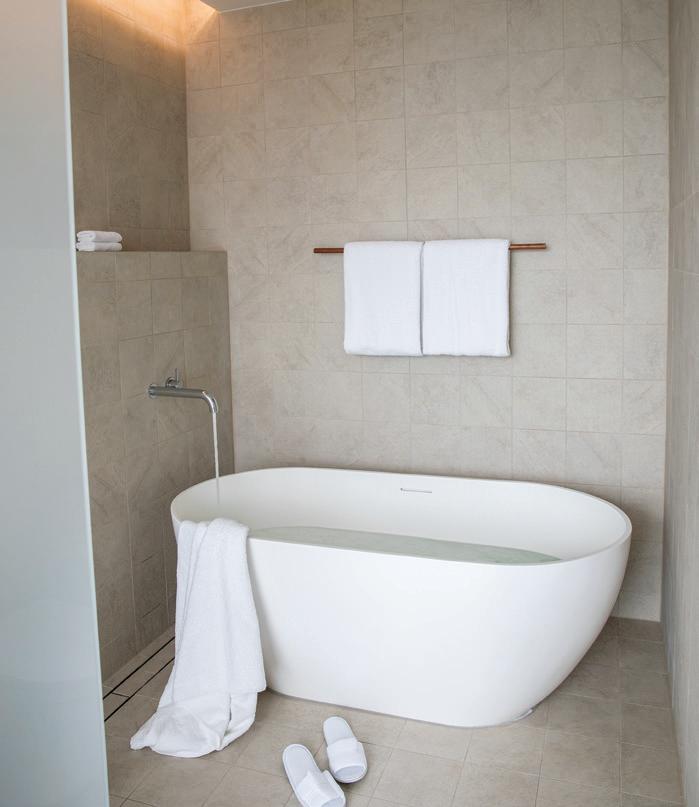
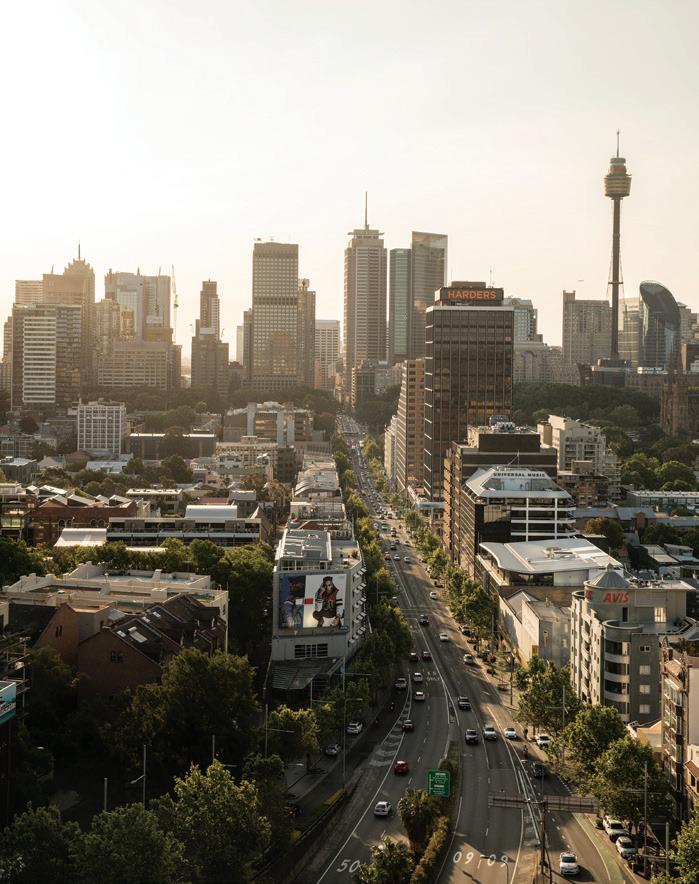
JUNE
Neil Breen on the challenges of dressing for a Sydney winter
AS THE YEARS ROLL ON, I DREAD THE WINTER MORE AND MORE.
I think it has a lot to do with my Queensland upbringing. In fact, it has everything to do with it. Yes, it gets cold in Brisbane in the winter, but only for, say, eight weeks. And the cold feels colder because the old Queenslander houses are built to handle the long, long summers, not the winters. So, when it’s cold, it’s cold.
But nothing like Sydney. Not for me anyway. When I first moved here nearly two decades ago, I didn’t take much notice of the winters. It was all a new experience and the cold was just dealt with.
But now I am well over them.
I am a keen swimmer, and I detest what the winters do to my morning routines. Yes, you can get to Cook + Phillip Park Pool where it’s nice and warm when you dive in. But you have to get there first. Walking up William St at 6.30am in July is not my idea of fun.
Two years ago, I decided to do something about it. So I took the winter on — head on. I bought a wetsuit and swam at Bondi Icebergs right through the winter every Saturday at 7am, just as I did through the summer.
I did it, and it hurt. Some Saturdays I hit the water and the “ice block headache” could last for a few laps. After two
or so laps the body would warm up. But the head never really did. The other horrible part occurred after tumble-turning at each end. As you kicked off the wall, a small film of cold water would get under the wet suit at the back of your neck and run down your body. I dreaded tumble-turning.
When winter ended I convinced myself it wasn’t that bad. But last winter, I dogged it. I couldn’t go through that again. That was madness.
I have never really learnt to deal with winter because the Queenslander in me means I have never had the right wardrobe. Why spend money on stuff you need for six to eight weeks?
In my day job, I spend a lot of
time outside. I know I should buy a big overcoat, but I’ve just never convinced myself it’s 100 per cent worth it. Then I stand in the cold and lament why I don’t have one. A guy I work with has one and I am forever saying to him “I have to get one”.
For the past few Sundays at Bondi Junction I’ve looked at a lot of big winter overcoats which would be suitable for work. Still, I baulk every time. Do I really need one? Is it worth it? Could I be bothered lugging it around?
I do not even own a proper woollen jumper.
Last winter I did make a big leap forward. I bought a longsleeved winter pyjama top from Peter Alexander.

This attitude towards winter has cost me dearly in the past. In 2011 I travelled to London in the first week of March and stupidly thought to myself, “How good, it’ll be spring when I am there”. I froze all week. I even attended Wembley — on March 1 no less — wearing a business shirt and suit jacket. I have never been so cold. Spring? What was I thinking?
This winter I am determined not to freeze. I am going to buy that overcoat. I have no idea where I’ll store it, but I will get one. I think. But I draw the line at a bulky woollen jumper.








